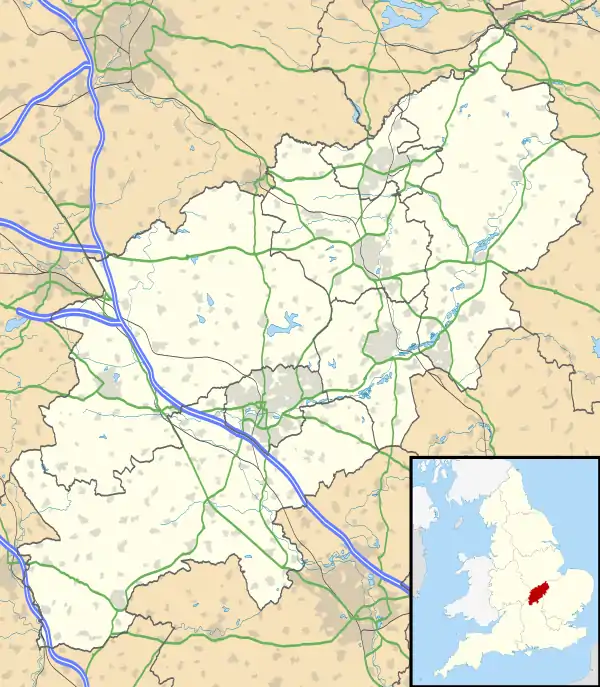Onley (lost settlement)
The lost village of Onley is in the parish of Barby in the English county of Northamptonshire.[1] The site is bordered on the north by the M45 motorway. On the east are Onley and Rye Hill prisons, and on the south-west is the A45 road. The Oxford Canal and the disused trackbed of the Great Central Railway run close to the eastern boundary.
Deserted Village of Onley | |
|---|---|
Lost settlement | |
 Open farmland where once stood the village of Onley | |
 Deserted Village of Onley Onley within Northamptonshire | |
| Coordinates: 52°19′30″N 1°15′30″W | |
| Country | England |
| District | Daventry |
| Map Ref: SP511707 | |
History
Onley was presumed to be included under entries for Barby in taxation records before 1272.[2]
The first known mention of Onley is in 1272, when it was recorded as being in the possession of George de Cantelupe along with the manor of Barby. The entry records that "Virgates [3] in villeinage [4] are valued at 9 shilling per annum".
Records in 1345 mention ‘Tenements in Onle’,[5] which may imply that at that time the village was still viable.
There is no further record of Onley until the early part of the 18th century, when the village was described as only a hamlet of seven shepherds' houses, which implies that the site had become pasture land for sheep.
Records of 1841 show that 19 people lived on the site of Onley in five scattered farms which still exist on the land to this day.
Remains today
The earthwork remains of today lie either side of a stream that runs from south to west across the site with the north-eastern end of the stream now in a culvert. The whole area of the village site covers 28 hectares with much of the earthworks well preserved. There is some difficulty in interpreting some of the earthworks due to the site being over ploughed in narrow ridge and furrow which has smoothed and flattened some of the earthworks of the village. The features of this site combine to make Onley lost village one of the most important sites of this kind in the country, despite the lack of documentation.[6]
References
- ’OS’ Explorer Map, Rugby & Daventry 222, ISBN 978-0-319-23734-2
- An Inventory of Archaeological Sites in North West Northamptonshire, Page 12, 2nd paragraph. ISBN 0-11-700900-8
- The virgate was a unit in the assessment system in most of the counties of Wessex and western Mercia, one quarter of a hide or 30 fiscal acres.
- In economic terms, the villagers were indistinguishable from Freemen or freemen. They were the most substantial group among the unfree peasantry, possessing on average 30 acres (120,000 m2) of land and two plough oxen.
- An Inventory of Archaeological Sites in North West Northamptonshire, Page 12. ISBN 0-11-700900-8
- An Inventory of Archaeological Sites in North West Northamptonshire, Page 13, Statement of the Royal Commission on Historical Monuments ISBN 0-11-700900-8